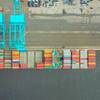Dutch Police Investigate Illegal Bunker Fuel Blending
Dutch Marine Police investigate alleged bunker fuel oil blending with hazardous substances in Port of Rotterdam
"During three days, we checked whether 30 vessels had the correct documentation. In 12 cases, documents were forged, or the environmental law was violated," Hans Tuinder, head of the Criminal Investigation department for the Marine Police, told Xinhua.
Over 22,000 vessels are bunkered in the Netherlands annually, taking in around 13 million tonnes of fuel in total. The port of Rotterdam is a major trading location, the source of around 88 percent of all bunker fuel.
A study conducted by the scientific institute CE Delft last year showed some ocean-going vessels were bunkered by fuel oil contaminated with hazardous waste materials.
Fuel oil "naturally" contains a variety of hazardous substances in high concentrations. These are substances present in the crude oil feedstock from which the fuel oil derives from and they end up in a concentrated form in the residue during the refining process.But some oil companies' illegal practices make it worse. Instead of taking their waste material to a recognized waste processing company, they blend those materials in fuel oil, which substantially lowers their cost.
"There is strong evidence that many [bunker] ships blend their waste material with heavy fuel oil. That is very lucrative for them because you not only don't need to pay for delivering your waste material, but also will even get paid for the blended oil," said Marine officer Tim Tichelaar.
The practices will not only cause serious damage to ship engines, but also will pose health risks to staff members and residents in surrounding areas, study showed.













